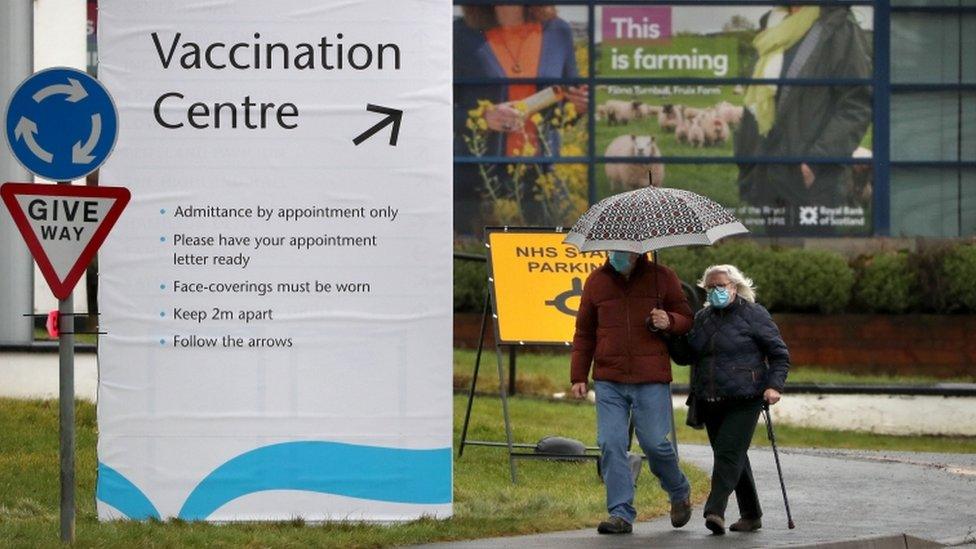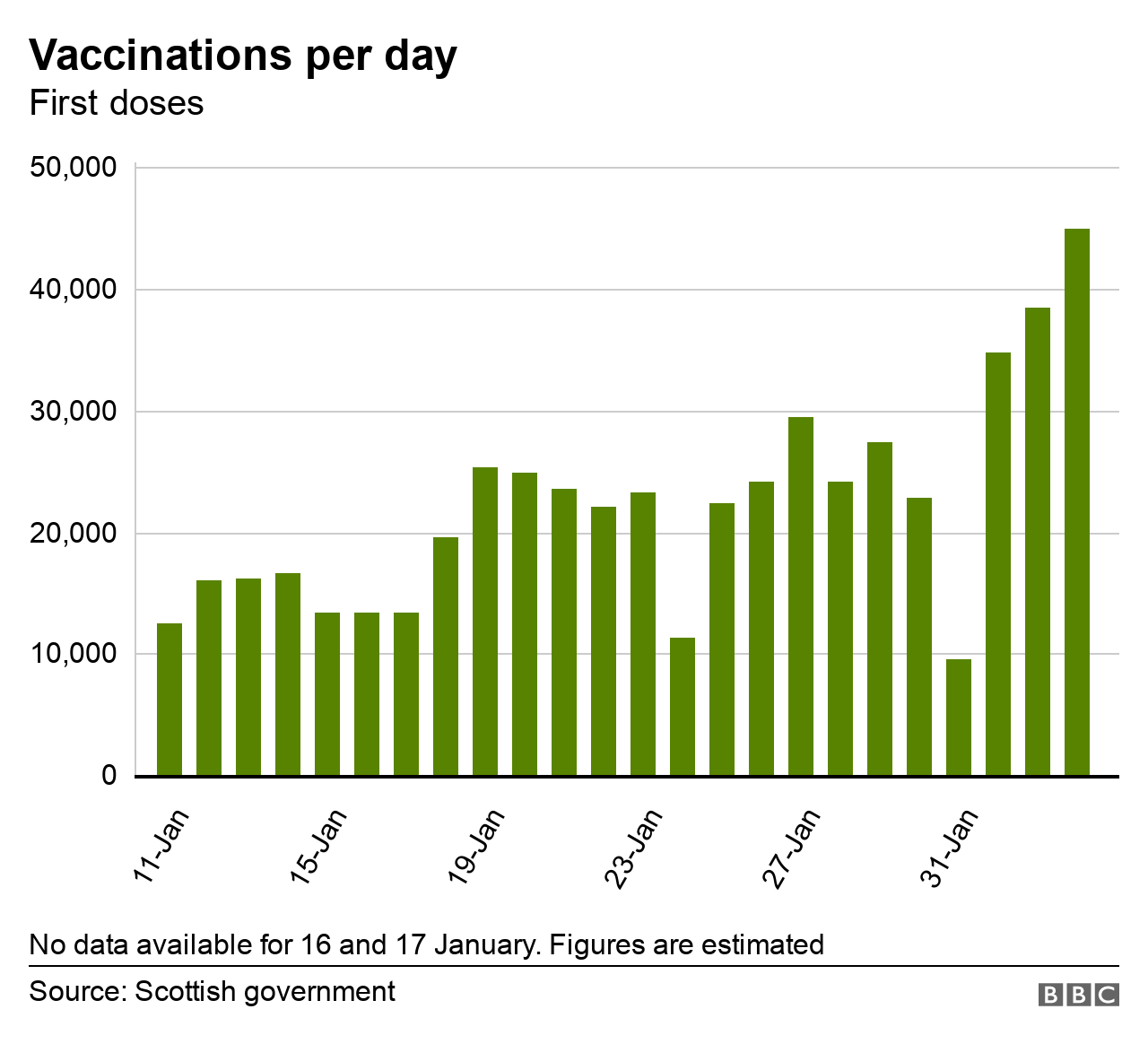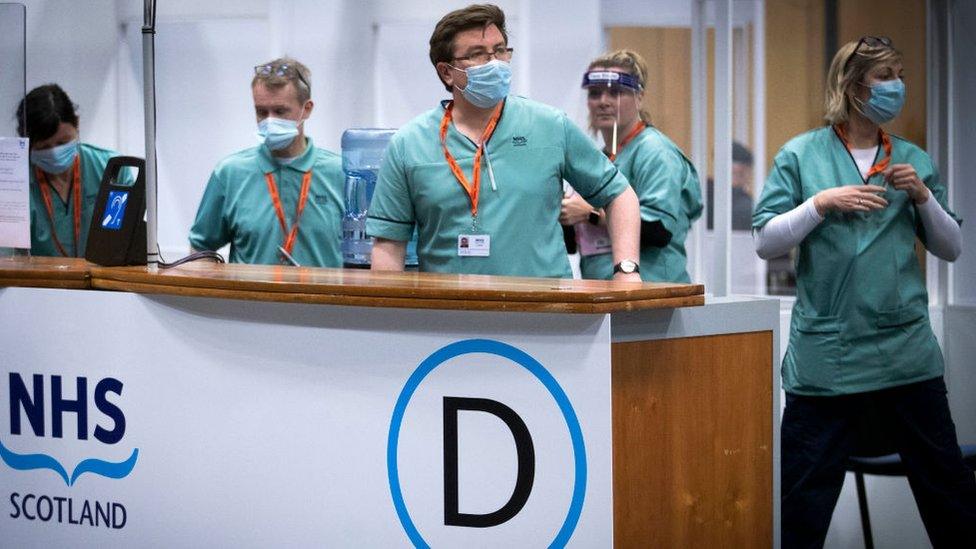Covid in Scotland: 'Ray of sunshine' from latest figures
- Published

New vaccination centres opened in Edinburgh and Aberdeen earlier this week
The percentage of people testing positive for Covid in Scotland has fallen to its lowest rate for more than a month.
The latest figures showed that 4.9% of the tests carried out on Wednesday were positive.
It means the country's positivity rate has fallen below the World Health Organisation's level two target of 5%.
Scotland has also vaccinated a further 45,085 people in the past 24 hours - its highest daily total so far.
It brings the total number of people to have received their first dose to 694,347.
The country's vaccine programme - which has been lagging behind the rest of the UK in the overall percentage of people it has vaccinated - has ramped up since the opening of two further mass vaccination centres at the start of this week.
First Minister Nicola Sturgeon said the statistics showed that things were going in the right direction, but warned that the situation could very easily reverse if people dropped their guard.
She added: "We should never read too much into a single day's figures, obviously, but that said any day with test positivity below 5% - particularly given the phase of the pandemic we are in right now - is welcome.
"Today is the first time we've had that in more than a month.
"Given how grim things have been recently, we should allow ourselves to reflect just a little bit on the rays of sunshine when they appear, and that is undoubtedly a small ray of sunshine."

The daily percentage figure for positive tests was below 5% and the seven day average continued its downward trend
The deaths of a further 53 people who had tested positive for the virus were recorded on Wednesday, bringing the total by that measure to 6,322.
But the number of Covid patients in hospital wards and intensive care units is continuing to gradually fall - although Ms Sturgeon stressed that the NHS remained under "severe pressure".
All of mainland Scotland and some islands will remain in the current level four restrictions until at least the end of the month, although Ms Sturgeon has said some limited easing might be possible in March.
However, she told her daily briefing that the government's approach to easing would be "children first" - which might mean adults would have to continue to make sacrifices for a bit longer to allow schools to reopen.
The first minister also said case numbers still needed to fall to a much lower level before things could return to normal.

A record number of vaccinations were administered in the past 24 hours
She said there had been a debate in the media about whether the aim should be to ease the pressures on the NHS and then begin to open up society again, or to keep driving infection rates down as low as possible before opening up.
Ms Sturgeon said: "I am in the latter camp, because we know from past experience if we open up too much when infection levels are still quite high it quickly can run out of control again.
"I am very much in the elimination camp on this - get it as low as we can to open up as much normality and give us the best chance of controlling it.
"We got very close to that in the summer, and then international travel set us back again."

She admitted that the restrictions on travel should have gone further at that stage, and that she planned to "err on the other side this time" by introducing tougher quarantine rules in the future.
However, she did not say how the "managed quarantine" of international travellers would work in practice, or when it would begin.
Scottish Conservatives leader Douglas Ross said it was "thoroughly good news" that test positivity levels were below 5%.
And he said he was encouraged that the country's vaccination rollout was "finally ramping up" - and praised the armed forces personnel who were assisting the NHS.
Mr Ross said he hoped the improvement continued seven days a week, and that there would no longer be drop-offs on Sundays.

